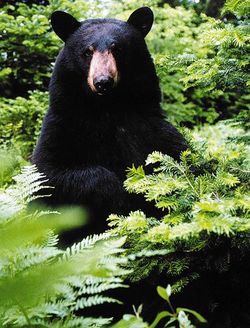
Five to seven months without eating, drinking, urinating or defecating. It's not a punishment, it's hibernation, and bears do it every winter. Until now, however, little was known about the physiological changes that allow a bear to survive hibernation.
A study released today by researchers at the University of Alaska, Fairbanks, sheds some light on how bears manage to avoid starvation and muscle atrophy while hibernating, according to . Researchers studied five hibernating bears for five winter months in a near-natural environment, meaning that each bear was given an artificial den in the forest and fitted with a sensor to record their temperature and hear rate.
The results of the study may contribute to emergency medical care by helping scientists understand how lowering the metabolic needs of a patient may extend the “golden hour,” the hour after trauma when medical treatment is most effective.
–Will Grant
Photo courtesy of